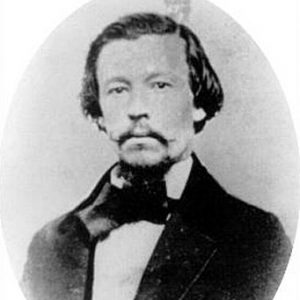calsfoundation@cals.org
Lucius Marshall (Marsh) Walker (1829–1863)
An antebellum plantation owner in St. Francis County and nephew of President James K. Polk, Lucius Marshall (Marsh) Walker served as a Confederate brigadier general in the Western Theater and Trans-Mississippi Department during the Civil War. He is most famous for his death in a wartime duel with Brigadier General John Sappington Marmaduke during the Little Rock Campaign.
Marsh Walker was born in Columbia, Tennessee, on October 18, 1829, the third child and eldest son of Jane Maria Polk Walker and James Walker, who was a Jacksonian political operator and entrepreneur. Walker received an at-large appointment to the United States Military Academy at West Point in 1846, graduating fifteenth out of forty-four cadets in the class of 1850.
Brevet Second Lieutenant Walker served initially at the School of Cavalry Practice in Carlisle Barracks, Pennsylvania. In 1851, he transferred to the Second Dragoon Regiment stationed at Fort Martin Scott on the Texas frontier, where he was promoted to the full rank of second lieutenant on August 8, 1851. Later, he performed scouting duty out of Fort Mason, Texas. Walker resigned his commission on March 31, 1852, to establish a mercantile business in Memphis, Tennessee, and to operate one of his father’s plantations across the Mississippi River in St. Francis County. He married Celestine “Cellie” Garth of Albemarle, Virginia, in Columbia, Tennessee, on November 27, 1856. They had three daughters prior to the war and had a son shortly before the duel.
At the outset of the Civil War, Walker recruited Confederate troops in St. Francis County but ultimately received a commission as lieutenant colonel of the Fortieth Tennessee Infantry. Promoted to colonel on November 11, 1861, he commanded the post at Memphis until being made brigadier general with rank to date from March 11, 1862. From February through April of 1862, Walker participated in the campaign for Island No. 10, but illness severely limited his service for months thereafter and kept him out of the Battle of Shiloh. He recovered in time to serve in the subsequent operations in Mississippi, including the Battle of Corinth, the retreat to Tupelo, and the Battle of Farmington. Despite some success at Farmington, where his brigade drove its opponents from the field, Walker fell out of favor with General Braxton Bragg (who considered Walker unfit for command). Another bout of illness required a leave of absence in late 1862.
By March 1863, Walker had transferred to the Trans-Mississippi Department and was serving in the District of Arkansas under Lieutenant General Theophilus Hunter Holmes. He commanded a cavalry division composed of the brigades of Colonel Archibald Stephenson Dobbins and Colonel Robert Crittenden Newton. He led this command at the Battle of Helena on July 4, 1863. Poor communication led to failed coordination of the Confederate attack against the Federal position at Rightor Hill, which aided the eventual Federal victory in the battle and initiated a series of disputes between Marmaduke and Walker.
After the battle, Marmaduke complained officially that Walker did not support his left flank, despite at least two requests, which prevented Marmaduke from achieving his tactical objective. Marmaduke retaliated by not informing Walker of his subsequent retreat, which left Walker’s command exposed at the end of the battle. Walker claimed that concerns for his own position limited the amount of aid he could render, but Holmes accepted Marmaduke’s account and criticized Walker’s lack of action.
The rift grew during the subsequent retreat toward Little Rock (Pulaski County), when Walker and Marmaduke commanded a joint rearguard. Following the August 25 Skirmish at Brownsville and the renewed Confederate retreat, Walker failed to carry out his portion of a plan to ambush the Federal cavalry. Walker’s inaction again left Marmaduke’s command exposed and vulnerable to capture.
Between August and September, Major General Sterling Price temporarily commanded the District of Arkansas and inherited the problem of the fractured relationship between Marmaduke and Walker. On August 27, 1863, during the Action at Reed’s Bridge near Jacksonville (Pulaski County), Walker refused to meet with Marmaduke to discuss strategy. Soon thereafter, Marmaduke openly questioned Walker’s ability as a cavalry commander. Although Marmaduke stated in writing that he did not accuse Walker of cowardice, he confirmed his negative opinion of Walker’s ability and threatened to resign unless reassigned. During subsequent communications between principals and seconds, Colonel Robert H. Crockett (acting as Walker’s second) challenged Marmaduke without consulting Walker, which Captain John C. Moore accepted on Marmaduke’s behalf (likewise acting without knowledge of his principal).
Despite Price’s efforts to prevent it, the duel took place at dawn on September 6, 1863, at the Godfrey Le Fevre plantation seven miles south of Little Rock on the north side of the Arkansas River. Marmaduke and Walker both fired Colt Navy revolvers and missed on their initial exchange. Marmaduke then fired a second shot, which mortally wounded Walker. Marmaduke apologized to Walker and had him transported back to Little Rock in his personal ambulance. Walker learned of the birth of his son later that day and died the next day, September 7, 1863; he is buried in Memphis in the Chapel Hill section of Elmwood Cemetery under a white obelisk topped with a cross.
After the duel, Price briefly placed Marmaduke under arrest but soon released him due to concerns about the ongoing campaign. Bitterness over the duel lingered, especially among Walker’s friends and troops, but no further official actions or repercussions occurred. Marmaduke expressed considerable regrets over the duel for the remainder of his life.
For additional information:
Cullum, George Washington. Biographical Register of the Officers and Graduates of the U.S. Military Academy at West Point. Vol. 2, 1841–1867. New York: D. Van Nostrand, 1868.
Huff, Leo E. “The Last Duel in Arkansas: The Marmaduke-Walker Duel.” Arkansas Historical Quarterly 23 (Spring 1964): 36–49.
The War of the Rebellion: A Compilation of the Official Records of the Union and Confederate Armies. Series 1, Vol. 22, Part 1. Washington DC: Government Printing Office, 1888.
Warner, Ezra J. Generals in Gray: Lives of the Confederate Commanders. Baton Rouge: Louisiana University Press, 1987.
Watson, Elbert R. “James Walker of Columbia: Polk’s Critic and Compatriot.” Tennessee Historical Quarterly 23 (March 1964): 24–37.
Welsh, Jack D. Medical Histories of Confederate Generals. Kent, OH: Kent State University Press, 1995.
Robert Patrick Bender
Eastern New Mexico University–Roswell
 Civil War through Reconstruction, 1861 through 1874
Civil War through Reconstruction, 1861 through 1874 Military
Military ACWSC Logo
ACWSC Logo  Lucius Walker
Lucius Walker 



Comments
No comments on this entry yet.